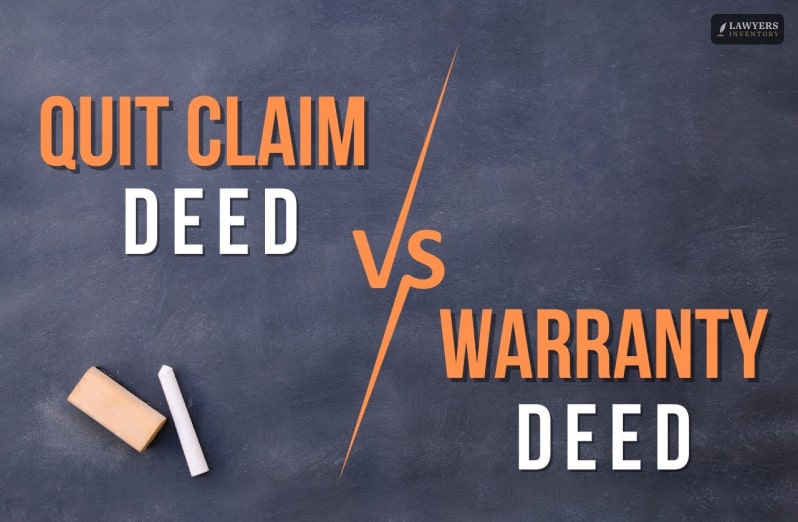
A deed is a written document that provides evidence of a transfer of ownership or interest in the property from one party to another. Additionally, it is legally binding and establishes the rights and obligations of all parties mentioned in the deed.
Furthermore, the deed contains a complete description of the property being transferred, proper identification of all parties involved in the transfer, and a complete set of terms and conditions of the transfer.
To enforce the deed, all parties mentioned must sign it in the presence of witnesses. Moreover, any other legal requirement is fulfilled before bringing the deed into work. Once delivered, the deed conveys all legal and complete ownership related to the property to the grantee.
There are many types of deeds relating to property, but two are the most important. They share a lot of similarities and differences. In this article, we will discuss warranty deed vs. Quit Claim Deed.
Warranty Deed Vs. Quit Claim Deed: All You Need to Know

Before jumping into the differences and similarities between these two deeds, one must understand what both of them are.
Both of these deeds can transfer property from one person to another. However, both are not the same and do not protect the same rights of the parties involved.
What is a Quit Claim Deed?

A quit claim deed is a legal document that transfers real estate ownership from one person to another. Unlike a warranty deed, which guarantees a clear title, a quitclaim deed offers no such assurances.
To understand it better, imagine buying a car without a warranty. You’re taking a risk that there might be hidden problems that you won’t discover until later. A quitclaim deed is similar.
The seller says, “I’m transferring whatever ownership I have in this property to you, but I’m not guaranteeing that I have a clear title or that there aren’t any problems.”
Quitclaim deeds are often used when the buyer is already aware of potential issues with the property.
For example, if a parent wants to transfer ownership of a house to their child, they might use a quitclaim deed. Or, if someone is buying property from a family member who has inherited it, they might use a quitclaim deed.
Key Points About Quitclaim Deeds:
- No guarantee of clear title: The seller does not promise to defend the buyer against future claims.
- Used in specific situations: Quitclaim deeds are often used when the buyer is aware of potential issues with the property.
- Requires caution: Buyers should be cautious when using a quit claim deed and consult with an attorney.
What is a Warranty Deed?

A warranty deed is a legal document that transfers real estate ownership from one person to another. It’s essentially a contract that guarantees the buyer a strong guarantee that the seller has clear title to the property and the right to sell it.
This means the seller promises no hidden problems or claims against the property that could affect the buyer’s ownership.
A warranty deed is like buying a car with a full warranty. The seller guarantees that the car is in good condition and has no major defects. If something goes wrong, the seller is responsible for fixing it.
Conversely, a quitclaim deed is like buying a car “as is.” The seller offers no guarantees about the car’s condition. If there are problems, the buyer is responsible for fixing them.
When you buy a house with a warranty deed, you’re essentially buying peace of mind. If someone later claims ownership of the property or if there are hidden liens or encumbrances, the seller is obligated to defend your title and resolve the issue. This provides you with a high level of protection as a buyer.
Key Points About Warranty Deeds:
- Guarantees clear title: The seller promises to defend the buyer against any future claims to the property.
- Protects the buyer: Offers a high level of protection for the buyer.
- Common in real estate transactions: Warranty deeds are widely used in home sales and other real estate transactions.
- Requires legal expertise: Drafting a warranty deed can be complex and should be handled by a legal professional.
Warranty Deed Vs. Quit Claim Deed: When Should You Choose What?
When buying or selling real estate, one of the most important decisions you’ll need to make is whether to use a warranty or quitclaim deed. Both documents transfer property ownership, but they offer different levels of protection for the buyer.
When to Use a Warranty Deed
A warranty deed is generally the best choice for buyers, especially if you’re purchasing a property from a stranger.
It provides you with maximum protection and peace of mind. Here are some situations where you might consider using a warranty deed:
- Buying a home from a seller you don’t know: A warranty deed assures you that the seller has a clear title and is not hiding any problems.
- Purchasing a property from a developer: Developers typically use warranty deeds to sell new homes.
- Refinancing your mortgage: If you’re refinancing your mortgage, you’ll likely need to use a warranty deed to transfer the property from you to the lender.
When to Use a Quitclaim Deed
While warranty deeds are more common, a quitclaim deed might be appropriate in some situations. Here are a few examples:
- Transferring property between family members: If you’re transferring property to a family member, such as a child or spouse, a quitclaim deed might be a simpler option.
- Correcting a title error: If there’s a minor error in the property title, a quitclaim deed can be used to correct it.
- Clearing up liens or encumbrances: If there are any liens or encumbrances on the property, a quitclaim deed can transfer ownership and clear up these issues.
Important Considerations
- Consult with an attorney: Before choosing a warranty deed or a quitclaim deed, it’s essential to consult with a real estate attorney. They can help you understand the implications of each option and advise you on the best course of action for your situation.
- Consider insurance: Even with a warranty deed, purchasing title insurance is a good idea to protect yourself against any unforeseen title defects.
Wrap Up!
So, here is a concluding statement on the debate of Warranty Deed vs Quit Claim Deed. Warranty deeds assure the recipe and guarantee a clear title and protection against claims.
Choosing the deed that does try to call you depends on your specific circumstances and the level of protection that you may require against it.
However, regardless of the deed you choose, it is best to work with a trusted legal professional who will guide you in all property transfer matters.
We hope you liked reading the article and found it informative. For more such blogs, stay tuned! Also, do not forget to let us know in the comments below what else you would like to read!
Read More:







0 Reply
No comments yet.